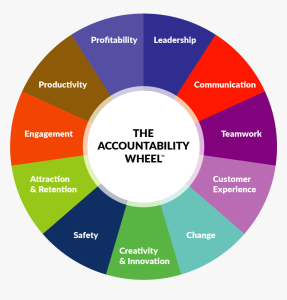Now that you know the difference between being responsible and accountable, how do you create a culture that reflects accountability? Think of all the places and people to whom you are accountable
There are 4 basic rules to creating a team, or an organization or even a family that is accountable
1. Consequences . There are consequences to everything we do or don’t do. We need to determine whether we are being accountable to ourselves or others. We need to face the consequences as well. Lately we have heard so much about protecting or sheltering our kids or coworkers from bad results. Remember everyone gets a trophy? Look at the consequences of that. If we do or say something that did not meet expectations or caused issues we need to accept our role in it and fix it. Then we make sure it doesn’t happen again When we make a mistake we acknowledge it, fix it, and don’t repeat it. If we repeat, it is now a choice and not a good one!
2. Expectations At every level of life expectations are set to enable us to know how to perform and what we impact. It starts as kids, or at least it should, doing chores and being responsible for completing tasks. In terms of your staff do you set expectations then let them be accountable for their performance? Hopefully, you are not micromanaging them but instead supporting them to enable them to follow through with what they said they would do. When you are setting the expectations and teaching them what needs to be done there is a simple 5 step process tell show do feedback repeat. Tell them what needs to be done and how, show them how to do it, let them do it, give feedback and repeat the process. Show your staff, peers, family what you expect and how to treat you Set boundaries
3 Compounded Returns We know about compounded interest and compounded gross profits but what is compounded accountability? it refers to the more structure and development you do in the beginning to get the desired results, the more the behavior will compound and grow. The first deposit in the accountability culture is before a person is hired, letting them know what is expected in terms of performance and the impact of their behaviors. The next step is ongoing feedback and having clear conversations to assure each person is aware of how what they do affects others and themselves. Recognize from the beginning that you can not coach someone who isn’t committed to the process of being accountable
4 Reflected behaviors Your staff will be accountable if you are. it’s that simple and that difficult. As Gandhi said be the change you want to see. Know what you want be that and create the environment that reflects it
To facilitate a culture of accountability here are a few tips
- Know exactly what you want. How will the culture function/perform? What is the criteria for success?
- Make sure you are explicit in what you want. Don’t make people read your mind or assume.
- Enable ownership of projects.
- Ask the right people in the right roles. Make sure they are capable and even more make sure they want to do the work.
- Create systems that everyone sees and are visibly displayed in a common area
- Define what is negotiable and what isn’t
- Above all make sure they know you care about the outcomes and the impact on the organization
A culture of accountability impacts performance on all levels which impacts engagement and the success of your organization.
Recent Comments